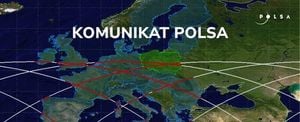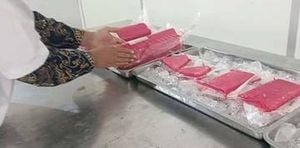The Australian Taxation Office (ATO) is gearing up for a busy tax season as it prepares to scrutinize the returns of 15 million taxpayers starting July 1, 2025. This year, the ATO will pay particular attention to work-related expenses, working-from-home claims, and the growing trend of side hustles. With nearly one million Australians engaging in secondary income sources, the tax office has signaled that it will be vigilant against exaggerated claims.
According to ATO assistant commissioner Rob Thomson, last year's tax season revealed some "outrageous" claims that raised eyebrows. For instance, one taxpayer attempted to claim a haircut as a work-related expense after attending a two-day conference in Sydney. In another case, a truck driver sought to deduct swimwear purchased for a casual dip during a highway stop. Additionally, a person in the fashion industry tried to claim $10,000 worth of luxury clothing to appear "well presented" at work, while a real estate agent attempted to write off over $30,000 for new veneers.
Thomson remarked, "Maybe they were trying to distract from the fact that the third bedroom wasn’t really a third bedroom – who knows?" He emphasized that legitimate work-related expenses must have a direct connection to income-earning activities, and taxpayers should be prepared to substantiate their claims with receipts or invoices. In fact, two-thirds of all taxpayers who submitted returns last year included work-related expenses, but a small portion of individuals—about 2 million—were found to have made false claims.
Finder research indicates that while 90% of taxpayers are honest, around 5% tend to inflate their deductions, and 3% fail to report overseas income. Thomson cautioned, "If your deductions don’t pass the pub test, it’s highly unlikely your claim would meet the ATO’s strict criteria." He also warned against common misconceptions, such as claiming personal expenses like travel to and from work or childcare costs.
In a significant policy shift, the Labor Party's proposed $1,000 standard deduction is moving forward following their recent electoral victory. This automatic deduction will allow taxpayers to claim up to $1,000 for work-related expenses without needing receipts, benefiting approximately 6 million workers who currently claim less than this amount. Mark Chapman, director of tax communications at H&R Block, explained that this reform aims to save time and resources for both taxpayers and the ATO.
Chapman noted, "The reform will allow taxpayers to choose to claim a $1,000 instant tax deduction instead of claiming individual work-related expenses. It is intended to save time and money for taxpayers, who won’t – in theory – need to keep receipts or invoices to substantiate the $1,000 deduction." However, he added that many taxpayers might still need to maintain full documentation, as they won’t know if their work-related expenses exceed $1,000 until the end of the tax year.
For those who wish to claim more than the $1,000 threshold, the current rules requiring full substantiation will still apply. Chapman warned that any taxpayer opting for the standard deduction will not be able to claim additional deductions beyond the $1,000 limit. He explained, "You will need to follow the current rules, which involve full substantiation of most expenses." This new measure also means that the ATO will not need to audit taxpayers claiming the standard deduction, allowing them to focus on higher-value claims.
Currently, taxpayers can claim up to $300 in work-related expenses without needing substantiation. However, if they exceed that amount, they must provide proof for all expenses, not just those over $300. This limit does not apply to certain claims like car expenses or travel allowances, which still require proper documentation.
As the ATO prepares for the upcoming tax season, it is also focusing on individuals who may forget to report multiple income sources, such as side hustles or second jobs. In 2024, more than 10 million people claimed work-related deductions, including those for working from home. The ATO has noted a rise in exaggerated claims, including a mechanic who attempted to deduct an air fryer, TV, and gaming console as work-related expenses. Another example involved a fashion industry manager who incorrectly claimed over $10,000 in luxury personal clothing.
Thomson reiterated that exaggerated tax deductions would not be tolerated, stating, "If your deductions don’t pass the pub test, it’s highly unlikely your claim would meet the ATO’s strict criteria." He cited a case where a taxpayer attempted to claim an engagement ring as a gift expense, further illustrating the lengths to which some individuals will go to secure deductions.
The ATO has also observed instances of double-dipping, where taxpayers claim a fixed hourly rate for working from home and then separately claim internet costs that are already included in that rate. Thomson advised taxpayers to familiarize themselves with the ATO’s guidelines to avoid such mistakes, likening it to not double-dipping chips at a party.
Chartered accountant Adrian Raftery emphasized the importance of understanding tax rules, noting that since March 2023, taxpayers have been required to keep a daily log of their working-from-home hours. He warned that those who deliberately break the rules should expect to face ATO penalties, which can range from 25% to 75% of any tax shortfall, depending on the severity of the infraction.
Taxpayers must include all income sources, including bank interest and money received through various apps, in their returns. Thomson encouraged individuals to wait for the ATO to pre-fill their returns after July 1, a process that last year involved pre-filling about 111 million pieces of information. The ATO also provides 40 industry-specific guides on its website to help taxpayers understand what they can and cannot claim based on their job and industry.
With these changes and the upcoming tax season, taxpayers are urged to stay informed and ensure their claims are legitimate to avoid complications with the ATO.





